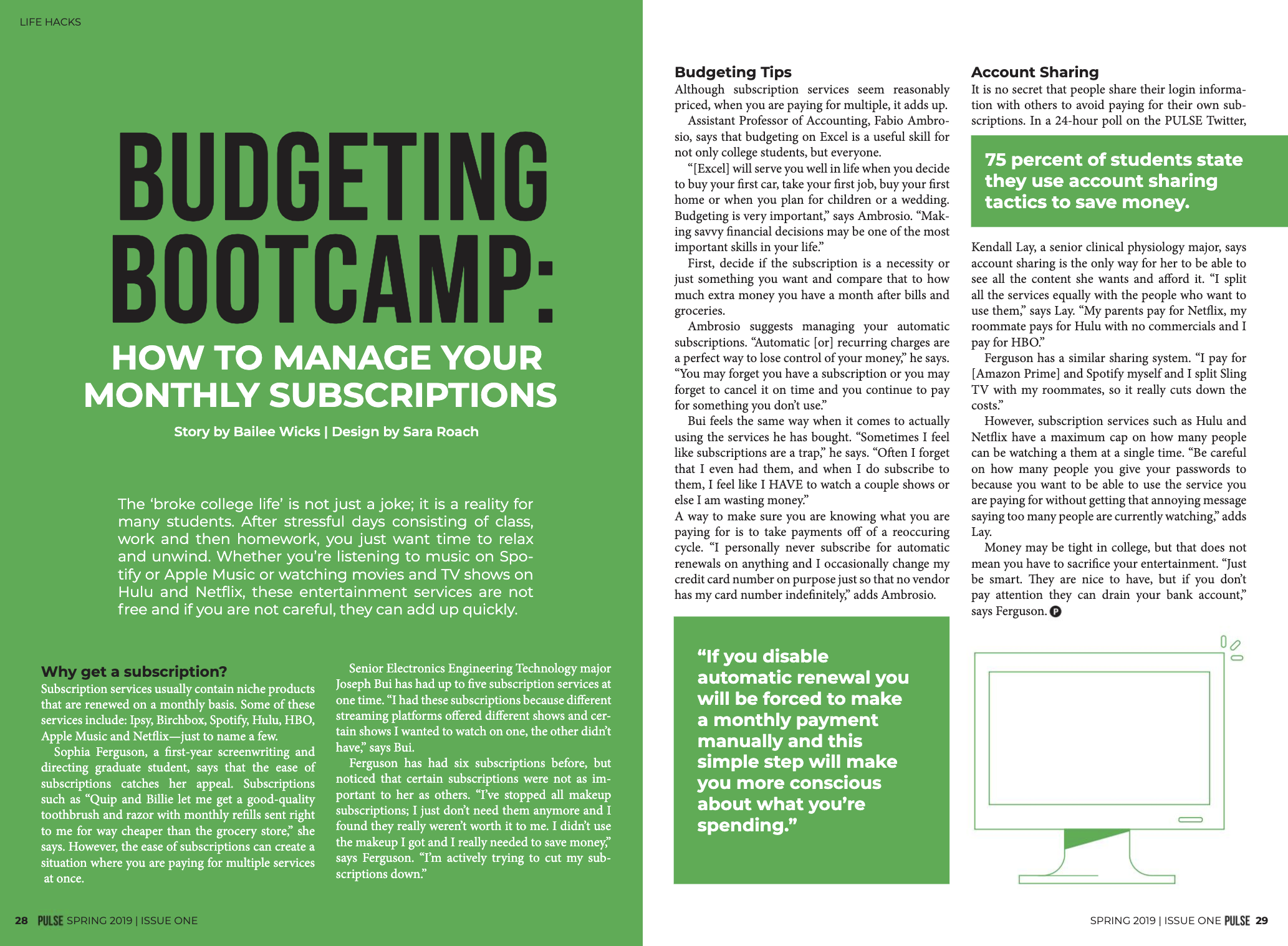Budgeting Bootcamp: How to Manage Your Monthly Subscriptions
Story by Bailee Wicks | Design by Sara Roach
The “broke college life” is not just a joke; it is a reality for many students. After stressful days consisting of class, work and then homework, you just want time to relax and unwind. Whether that is with music on Spotify or Apple Music or movies and TV shows on Hulu and Netflix, these entertainment services are not free and if you are not careful, they can add up quickly.
Why Get a subscription?
Subscription services usually contain niche products that are renewed on a monthly basis. Some of these services include: Ipsy, Birchbox, Spotify, Hulu, HBO, Apple Music, Netflix - just to name a few. First year screenwriting and directing graduate student, Sophia Ferguson says that the ease of subscriptions catches her appeal. Subscriptions such as “Quip and Billie let me get a good quality toothbrush and razor with monthly refills sent right to me for way cheaper than the grocery store,” says Ferguson. However, the ease of subscriptions can create a situation where you are paying for multiple services at once. Senior Electronics Engineering Technology major, Joseph Bui has had up to five subscription services at one time, says Bui. Ferguson has had six subscriptions before, but noticed that certain subscriptions were not as important to her as others. “I've stopped all makeup subscriptions, I just don't need them anymore and I found they really weren't worth it to me. I didn't use the makeup I got and I really needed to save money,” says Ferguson. “I'm actively trying to cut my subscriptions down.”
BUDGETING TIPS
Although subscription services seem reasonably priced, when you are paying for multiple, it adds up. Assistant Professor of Accounting, Fabio Ambrosio, says that budgeting on Excel is a useful skill for not only college students, but can benefit everyone. “[Excel] will serve you well in life when you decide to buy your first car, take your first job, buy your first home, or when you plan for children or a wedding. Budgeting is very important,” says Ambrosio.
First, decide if the subscription is a necessity or just something you want and compare that to how much extra money you have a month after bills and groceries. Ambrosio suggests managing your automatic subscriptions. “Automatic/recurring charges are a perfect way to lose control of your money,” he says. “You may forget you have a subscription or you may forget to cancel it on time and you continue to pay for something you don’t use.” Bui feels the same way when it comes to actually using the services he has bought. “Sometimes I feel like subscriptions are a trap,” says Bui.
A way to make sure you are knowing what you are paying for is to take payments off of a reoccurring cycle. “I personally never subscribe for automatic renewals on anything and I occasionally change my credit card number on purpose just so that no vendor has my card number indefinitely,” adds Ambrosio. “If you disable automatic renewal you will be forced to make a monthly payment manually and this simple step will make you more conscious about what you’re spending.”
ACCOUNT SHARING
It is no secret that people share their login information with others to avoid paying for their own subscriptions. In a 24 hour poll on the PULSE Twitter, 75 percent of students state they use account sharing tactics to save money. Kendall Lay, a senior clinical physiology major, says account sharing is the only way for her to be able to see all the content she wants and afford it. “I split all the services equally with the people who want to use them,” says Lay. “My parents pay for Netflix, my roommate pays for Hulu with no commercials and I pay for HBO.
However, subscription services such as Hulu and Netflix have a maximum cap on how many people can be watching a them at a single time. “Be careful on how many people you give your passwords to because you want to be able to use the service you are paying for without getting that annoying message saying too many people are currently watching,” adds Lay. Money may be tight in college, but that does not mean you have to sacrifice your entertainment. “Just be smart. They are nice to have, but if you don't pay attention they can drain your bank account,” says Ferguson.

